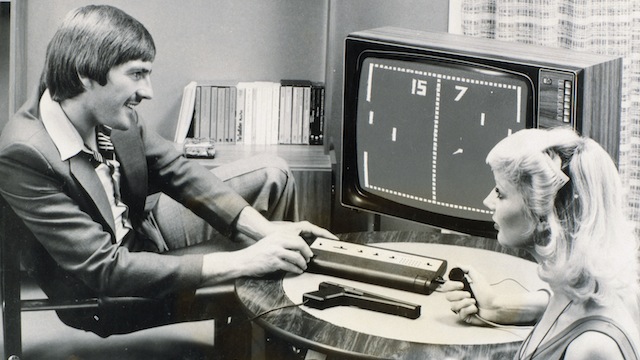Atari was once the most successful home video game companies in the world. That sounds impressive, but the fact that it was once one of the only home video game companies in the world is far more noteworthy. When a company leads the way like Atari did, it can be difficult for anyone else to gain traction as a worthwhile competitor. Unfortunately for Atari, that wasn’t the case in the video game industry.
While many of us hate to see something that holds such a sentimental value decaying because of its lack of monetary value, over the years we looked through our fingers and felt a twinge of guilt as the company was continuously overshadowed by other giants. Nintendo and other console/PC developers came onto the scene and, eventually, the name Atari was nothing more than a memory.
But Atari is more than a memory, and those who think otherwise may be surprised to hear that the company hasn’t disappeared over the years. As it turns out, they’ve just been waiting to make a comeback, albeit in a smaller fashion.
Most CEOs take on a failing company in hopes of bringing it back to its glory days, but Atari CEO Fred Chesnais isn’t one of them. In fact, he’s more than willing to leave those days in the past. Instead of setting Atari up for failure by trying to regain their share in the console market, the new executive is setting his sights on more realistic goals for the company’s future. And he’s starting by abandoning the branch that made them successful in the first place—consoles.
Earlier this year Chesnais told WIRED that he realized it’s time to “let other people be Atari.” Instead of trying to build the brand back to what it was, he’s allowing other studios who are already in touch with today’s audience to license the brand as a way of attracting more attention.
Instead of classic action or adventure games, Chesnais has chosen to steer the company down a new path in gaming. Earlier this year, they entered a partnership with FlowPlay, a social gaming studio that helped Atari create their own social casino gaming platform—Atari Casino. Set to launch next month, Atari Casino is reported to have one outlet for those looking to play with virtual money and another for those who wish to play with real money in states where the practice is allowed.
On paper, it’s a smart move for the company. Statista shows that the online gambling market has seen a steady rise in profits since 2003, a trend that they’ve predicted will continue into and beyond 2015.
However, that isn’t to say that they won’t face steep competition in their new market endeavors. Chesnais may be willing to let other gaming console companies “be Atari,” but there’s already an existing company that holds such a title for the online gaming community. Betfair, an online gaming group based out of the U.K., has already established itself as the world’s largest Internet betting exchange. It’s also currently available in U.S. states where gaming is legal. Thus, if Atari chooses to move forward in online gaming, they will soon find themselves going up against such industry giants.
Gaming isn’t the only market Atari has decided to dip its toes into. While working on targeting adults through their online gaming, the company is also in the process of making attempts to connect to a younger audience. This is, of course, an age group that the company initially attracted during their heyday with console games.
Chesnais believes that in today’s market, gaming companies are no longer competing against one another—they’re competing for the user’s time. And because two of the biggest time-pulls among the age group are social media and video-sharing sites, such as YouTube and Vine, Atari is looking to create their own, similar content through a project called Atari TV.
Established earlier this year, the first installments of the program feature a daily video blog called The Real Pele, which followed the soccer star throughout the World Cup in Brazil.
However, Atari’s ability to make a name for themselves in that market could prove to be just as difficult as their goal to enter online gaming. Each video that they’ve posted to their account only has a few thousand views, and subscriptions to the channel have remained in the low hundreds. With over 100 hours of content uploaded to their site every minute—that’s according to Expanded Ramblings— getting their share of the traffic could be harder than they anticipated.
It’s been challenging for Atari thus far to gain some headway, and it looks like it will continue to be so for some time while they press on and work in the shadows of their competitors. However, at least they won’t be in the shadow of their previous successes. It will be an uphill battle, but entering a new industry gives them an opportunity for a fresh start and, hopefully, a brighter outlook for the future.
There’s no denying that new projects from the company will likely lack the same enthralling aspect that the games of its past, but I can’t help but feel I owe them at least another look. It, if nothing else, will alleviate some of sympathy or pity I feel. They gave me Pong, so the least I can do is give them a little bit of my time. Who knows, maybe I’ll be pleasantly surprised.

